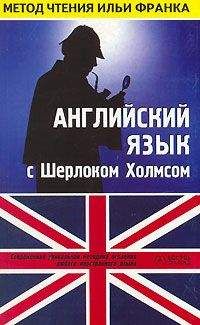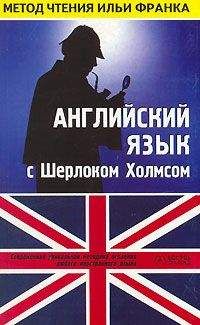"Not a doubt of that," said Holmes heartily (в этом нет ни малейшего сомнения, — искренне сказал Шерлок Холмс).
"Now, gentlemen," the Inspector remarked gravely (а теперь, джентльмены, — рассудительно заметил инспектор; gravely — серьезно, здраво, рассудительно; grave — серьезный), "the forms of the law must be complied with (надо соблюсти формальности закона). On Thursday the prisoner will be brought before the magistrates (в четверг пленник предстанет перед судьями), and your attendance will be required (и потребуется ваше присутствие; to attend — уделять внимание; посещать; присутствовать /на лекциях, собраниях и т. п./). Until then I will be responsible for him (до этого момента я отвечаю за него)." He rang the bell as he spoke (он позвонил в колокольчик при этих словах), and Jefferson Hope was led off by a couple of warders (и Джефферсона Хоупа вывели два тюремных надзирателя), while my friend and I made our way out of the Station and took a cab back to Baker Street (а мой друг и я покинули участок и взяли кеб, чтобы попасть обратно на Бейкер-стрит).
volunteer [, [email protected]' [email protected]], comply [ [email protected]'plaI], warder ['wO: [email protected]]
"There is only one point on which I should like a little more information," Sherlock Holmes said at last. "Who was your accomplice who came for the ring which I advertised?"
The prisoner winked at my friend jocosely. "I can tell my own secrets," he said, "but I don't get other people into trouble. I saw your advertisement, and I thought it might be a plant, or it might be the ring which I wanted. My friend volunteered to go and see. I think you'll own he did it smartly."
"Not a doubt of that," said Holmes heartily.
"Now, gentlemen," the Inspector remarked gravely, "the forms of the law must be complied with. On Thursday the prisoner will be brought before the magistrates, and your attendance will be required. Until then I will be responsible for him." He rang the bell as he spoke, and Jefferson Hope was led off by a couple of warders, while my friend and I made our way out of the Station and took a cab back to Baker Street.
Chapter VII. The Conclusion
(Заключение)
WE had all been warned to appear before the magistrates upon the Thursday (нас всех предупредили, /что нам необходимо/ предстать перед судом в четверг); but when the Thursday came there was no occasion for our testimony (но когда наступил четверг, наши показания не потребовались: «не было возможности для наших показаний»). A higher Judge had taken the matter in hand (высший судия взял дело в свои руки), and Jefferson Hope had been summoned before a tribunal (и Джефферсон Хоуп предстал перед трибуналом) where strict justice would be meted out to him (где ему будет отмерен строгий приговор; justice — справедливость). On the very night after his capture the aneurism burst (в ночь того же дня, когда он был арестован, его аневризма лопнула), and he was found in the morning stretched upon the floor of the cell (и утром его обнаружили лежащим на полу камеры; to stretch — растягивать/ся/, вытягивать/ся/), with a placid smile upon his face (с мирной улыбкой на лице), as though he had been able in his dying moments to look back upon a useful life, and on work well done (словно в свой предсмертный миг он мог оглянуться на жизнь, прожитую с толком, и хорошо сделанное дело; useful — полезный).
"Gregson and Lestrade will be wild about his death (Грегсон и Лестрейд будут вне себя при известии о его смерти)," Holmes remarked, as we chatted it over next evening (заметил Холмс, когда мы обсуждали это на следующий вечер; to chat — непринужденно болтать, беседовать). "Where will their grand advertisement be now (как им теперь себя рекламировать: «где будет их большая реклама»)?"
"I don't see that they had very much to do with his capture," I answered (не вижу, что они сыграли какую-то роль: «имели большое отношение к» в его поимке, — ответил я).
appear [@' [email protected]], occasion [@'keIZ(@)n], testimony [' [email protected]]
We had all been warned to appear before the magistrates upon the Thursday; but when the Thursday came there was no occasion for our testimony. A higher Judge had taken the matter in hand, and Jefferson Hope had been summoned before a tribunal where strict justice would be meted out to him. On the very night after his capture the aneurism burst, and he was found in the morning stretched upon the floor of the cell, with a placid smile upon his face, as though he had been able in his dying moments to look back upon a useful life, and on work well done.
"Gregson and Lestrade will be wild about his death," Holmes remarked, as we chatted it over next evening. "Where will their grand advertisement be now?"
"I don't see that they had very much to do with his capture," I answered.
"What you do in this world is a matter of no consequence (неважно, что вы делаете в этом мире: «что вы делаете в этом мире — дело, не имеющее значения»; consequence — последствие; важность, значимость)," returned my companion, bitterly (с горечью возразил мой компаньон). "The question is, what can you make people believe that you have done (вопрос в том, чтобы убедить: «заставить поверить» людей, что вы что-то сделали). Never mind (но неважно)," he continued, more brightly, after a pause (продолжал он, повеселев: «более радостно», после короткой паузы). "I would not have missed the investigation for anything (я бы ни за что не пропустил это расследование). There has been no better case within my recollection (на моей памяти лучшего случая и не было). Simple as it was, there were several most instructive points about it (каким бы простым оно ни было, в нем было несколько весьма поучительных моментов)."
"Simple!" I ejaculated (простым! — воскликнул я).
"Well, really, it can hardly be described as otherwise (ну, в самом деле, а как его еще охарактеризуешь: «оно едва ли может быть описано по-другому»)," said Sherlock Holmes, smiling at my surprise (сказал Шерлок Холмс, улыбаясь моему удивлению). "The proof of its intrinsic simplicity is (доказательством того, что само по себе оно было простым: «его коренной простоты», является то; intrinsic — присущий, свойственный; simplicity — простота), that without any help save a few very ordinary deductions (что без какой-либо помощи, если не считать нескольких вполне обыденных умозаключений) I was able to lay my hand upon the criminal within three days (я через три дня смог схватить: «наложить мою руку на» преступника; within — не позднее; в течение)."
"That is true (это верно)," said I.
consequence [' [email protected]], instructive [In'strVktIv], intrinsic [In'trInsIk]
"What you do in this world is a matter of no consequence," returned my companion, bitterly. "The question is, what can you make people believe that you have done. Never mind," he continued, more brightly, after a pause. "I would not have missed the investigation for anything. There has been no better case within my recollection. Simple as it was, there were several most instructive points about it."
"Simple!" I ejaculated.
"Well, really, it can hardly be described as otherwise," said Sherlock Holmes, smiling at my surprise. "The proof of its intrinsic simplicity is, that without any help save a few very ordinary deductions I was able to lay my hand upon the criminal within three days."
"That is true," said I.
"I have already explained to you (я уже объяснял вам) that what is out of the common is usually a guide rather than a hindrance (что то, что выходит за рамки обыденного, обычно является скорее подсказкой, чем помехой; guide — путеводитель; ориентир). In solving a problem of this sort (решая подобную задачу), the grand thing is to be able to reason backwards (важно суметь построить умозаключения от следствия к причине; backwards — в обратном направлении; grand — большой, величественный, грандиозный; главный, принципиальный, основной, очень важный). That is a very useful accomplishment (это очень полезная способность; accomplishment — талант, достоинство; to accomplish — совершать, выполнять; достигать; доводить до конца; достигать совершенства), and a very easy one (и очень легко приобретаемая: «и очень легкая»), but people do not practise it much (но ее не очень-то практикуют). In the every-day affairs of life it is more useful to reason forwards (в повседневной жизни: «в повседневных делах жизни» более полезно рассуждать от причины к следствию; forwards — вперед), and so the other comes to be neglected (так что обратным процессом обычно пренебрегают: «другой становится заброшенным»). There are fifty who can reason synthetically (на пятьдесят человек, которые могут рассуждать синтетически) for one who can reason analytically (приходится один, который может рассуждать аналитически)."
"I confess," said I, "that I do not quite follow you (признаюсь, — сказал я, — что не вполне вас понимаю)."
"I hardly expected that you would (едва ли я ожидал, что вы поймете). Let me see if I can make it clearer (давайте посмотрим, смогу ли я объяснить доступнее: «смогу ли я сделать это яснее»). Most people, if you describe a train of events to them (большинство людей, если вы опишите им последовательность событий), will tell you what the result would be (скажут вам, каков будет результат). They can put those events together in their minds (они могут умственно сопоставить эти события), and argue from them that something will come to pass (и на основании этого сделать вывод, что что-то произойдет; to come to pass — случаться, происходить). There are few people, however (однако мало найдется таких), who, if you told them a result (которые, если вы скажете им результат), would be able to evolve from their own inner consciousness (смогут воссоздать внутри себя: «по их внутреннему осознанию»; to evolve — развертывать; развивать, выводить; consciousness — понимание, осознание) what the steps were which led up to that result (каковы были те шаги, которые привели к такому результату). This power is what I mean when I talk of reasoning backwards, or analytically (эту способность я и имею в виду, когда я говорю о ретроспективном, или аналитическом мышлении; reasoning — рассуждение, умозаключение)."
neglect [nIg'lekt], synthetically [sIn'TetIk(@)lI], consciousness [' [email protected]@s]
"I have already explained to you that what is out of the common is usually a guide rather than a hindrance. In solving a problem of this sort, the grand thing is to be able to reason backwards. That is a very useful accomplishment, and a very easy one, but people do not practise it much. In the every-day affairs of life it is more useful to reason forwards, and so the other comes to be neglected. There are fifty who can reason synthetically for one who can reason analytically."



